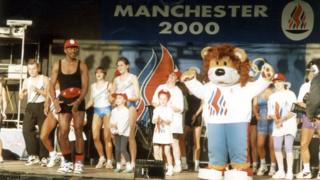Manchester lost 2000 Olympics to Sydney 'because of arrogance and old buffers'
 Image copyright
Getty Images
Image copyright
Getty Images
Manchester's bid to host the 2000 Olympics failed as "no-one in their right mind" would go there over Sydney, according to newly-released government files from an inquiry into the failure.
Documents on the doomed bid of 1993, released by the National Archives, gave various reasons the city missed out.
Damian Green, who later became an MP and cabinet member, said it was "hard to imagine" it ever being successful.
An aide blamed the use of "old buffers" and an "arrogant attitude".
'Past glories'
The host city for the first Olympics of the new millennium was chosen in September 1993 and Manchester went into the bidding process with high hopes. But it came third out of five hopeful cities, trailing behind winner Sydney and second-choice Beijing.
A "post-mortem" into the failure was conducted in February 1994.
"We have had too many nice old buffers running things or representing Britain on international sporting bodies," Downing Street aide Alex Allan said in a dispatch to the then Prime Minister John Major, citing as examples Mary Glen-Haig, an Olympian at the London Games in 1948, and sports administrator Marea Hartman, who died aged 73 later that year.
"We have also adopted rather an arrogant attitude, based either on past glories or on a belief that many of those now running international sporting bodies are corrupt and/or power-mad," Mr Allan added.
"Some probably are - but we didn't win any friends by saying so."
Meanwhile, Damian Green, who worked in the Prime Minister's Policy Unit in 1994 before becoming an MP three years later, said the reason was "obvious... no-one in their right mind would spend three weeks in Manchester rather than Sydney".
The secret files also contained a previously unseen speech celebrating Manchester's victory, which saw Mr Major commend Britain's "world-beating success".
The draft entitled "Prime Minister's statement: If Manchester wins" added: "This success shows that when we put our minds to something in Britain, we are world-beaters.
"We went for gold and got it."
However, defeat meant the victory speech was never heard in public.
Other files show correspondence between Mr Major and International Olympic Committee president Juan Antonio Samaranch in September 1993, ahead of the crucial vote, in which the prime minister hinted at the possibility of a meeting between the two.
You may also be interested in:
The reply was sent after the result, with Mr Samaranch expressing regret there could only be one winner and inviting the Major family to "visit the Olympic Museum at your best convenience".
Manchester would go on to host the 2002 Commonwealth Games, while London hosted the Olympics in 2012.